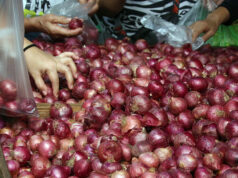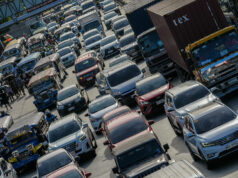Metro Manila risks reverting to strict lockdown as cases surge
By Gillian M. Cortez, Jenina P. Ibañez
and Beatrice M. Laforga, Reporters
THE presidential palace on Thursday threatened to put Manila and nearby cities back under a stricter lockdown if cases of the coronavirus that has sickened more than 61,000 and killed about 1,600 people in the Philippines continue to surge.
“If there is no improvement in the numbers and people become complacent, it’s possible for Metro Manila to go back to a modified enhanced community quarantine,” he told an online news briefing in Filipino.
He added that President Rodrigo R. Duterte had wanted to put the metro under a stricter lockdown starting July 16 as recommended by experts from the University of the Philippines, but Metro Manila mayors appealed to keep its general quarantine, promising to use targeted lockdowns instead.
Mr. Roque on Wednesday announced new quarantine levels starting July 16. Most areas will be under a modified general community quarantine provided they impose strict zoning.
Reverting to a strict lockdown is a cause for worry for local businesses that have yet to operate fully given restrictions under relaxed quarantine in many parts of the country.
The Department of Health reported 2,498 new coronavirus cases on Thursday, bringing the total to 61,266. The death toll rose to 1,643 after 29 more patients died, while recoveries increased by 467 to 21,449, it said in a bulletin.
A quarter of Philippine businesses remained permanently or temporarily shut despite easing levels of lockdown, Trade Secretary Ramon M. Lopez told reporters in a group message on Thursday.
About half of those that reopened are operating partially, while about a fifth have become fully operational, he said, citing a poll of 2,135 companies made on June 4 to 17.
Sales at partially operating businesses have plummeted by as much as 90%, Mr. Lopez said.
Business closures are “a cause for worry,” the Trade chief said. “But I am confident that we will bounce back because of good economic fundamentals, but we need to save companies and jobs to restart and recover faster.”
The Philippines, which had been one of Asia’s fastest-growing economies before the pandemic, is on the edge of a recession after economic growth shrank by 0.2% in the three months through March.
Economists expect the contraction to have worsened last quarter as an extended lockdown in Manila, the capital and nearby cities took a heavier toll on local consumption.
President Rodrigo R. Duterte locked down the main island of Luzon in mid-March, suspending work, classes and public transportation to contain the pandemic. People should stay home except to buy food and other basic goods, he said.
He extended the lockdown — one of the strictest and longest in the world — for the island twice and thrice for the capital region. The lockdown in Metro Manila has since been eased, with more businesses allowed to reopen with a skeletal workforce. Mass gatherings remained banned.
Mr. Lopez said the government has been helping companies through financing, training, webinars and policies so they can restart operations and stimulate demand.
Barbershops and salons may now operate at 75% of their capacity in areas under a modified general community quarantine, and 50% in places under a general quarantine. Dine-in operations at restaurants will be allowed to operate at the same levels starting July 21.
Loan applications from micro, small and medium enterprises with the Trade department’s financing arm Small Business Corp. have exceeded its P1-billion fund.
Meanwhile, Finance Secretary Carlos G. Dominguez III said looser quarantine in Metro Manila and other key cities was unlikely to help the economy get out of a looming recession.
“I don’t know if it will deepen the recession, it probably will level it off, but certainly it will not pull us up,” he told reporters in a Viber group message.
Mr. Dominguez had wanted the government to ease restrictions in the capital region as early as June, pushing for a targeted lockdown instead to boost an economy that the coronavirus had brought to a near standstill.
Economic managers would review macroeconomic assumptions, he said.
The Luzon-wide lockdown in the first 54 days cost the Philippine economy P1.1 trillion in potential revenue losses, equivalent to 5.56% of economic output, according to the National Economic and Development Authority.
Think tank Capital Economics projected the Philippine economy to contract by 8% this year, warning that a prolonged lockdown and the lack of fiscal support could delay the recovery.
“A long lockdown, which has now been in place for four months, and inadequate fiscal support, will delay the recovery in the Philippines,” it said in a note.
The palace on Wednesday said areas under the modified general community quarantine with strict granular lockdowns are Benguet, Baguio City, Ilocos Sur, Pangasinan, Ilocos Norte, La Union, Dagupan City, Cagayan, Isabela, Nueva Vizcaya, Bataan, Nueva Ecija, Pampanga, Bulacan, Tarlac, Zambales, Angeles City and Batangas.
Also included were Quezon, Lucena City, Oriental Mindoro, Occidental Mindoro, Puerto Princesa City, Albay, Masbate, Camarines Norte, Camarines Sur, Catanduanes, Sorsogon, Naga City, Iloilo, Negros Occidental, Capiz, Antique, Aklan, Guimaras, Iloilo City, Bacolod City, Negros Oriental, Bohol and Cebu Province.
Also under a modified general lockdown were Western Samar, Leyte, Biliran, Tacloban City, Zamboanga del Sur, Zamboanga Sibugay, Zamboanga del Norte, Misamis Occidental, Bukidnon, Lanao del Norte, Cagayan de Oro City, Iligan City, Davao Oriental, Davao del Norte, Davao del Sur, Davao de Oro, Davao City, Sultan Kudarat, Cotabato, South Cotabato, General Santos City, Lanao del Sur and Maguindanao.
Areas under a general community quarantine aside from Metro Manila were Laguna, Cavite, Rizal, Lapu Lapu City, Mandaue City, Ormoc City, Southern Leyte, Zamboanga City, Butuan City, Agusan del Norte, Basilan, Talisay, Minglanilla and Consolacion in Cebu Province.
Areas not mentioned in both classifications will be under a modified general community quarantine except for Cebu City, which was placed under a modified enhanced community quarantine. — with Vann Marlo M. Villegas



